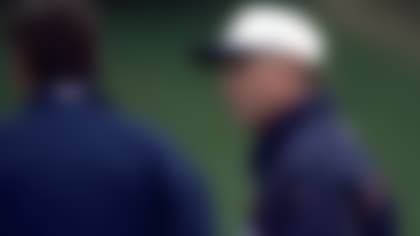NEW YORK -- The co-chairman of the NFL's Brain, Head and Neck Medical Committee doesn't see four concussions sustained by players during the first weekend of the regular season as a trend.
But Dr. Hunt Batjer said Monday that the rate of concussions is something the league and its medical staff will closely monitor throughout the season.
"One weekend doesn't make a trend," Batjer said. "It's certainly a number that caught everyone's eye.
"If this pace continues, it's either better reporting of the symptoms, or it is something else systemic. We must keep a close eye on this, and we will."
-- Dr. Hunt Batjer
Sustaining concussions Sunday were quarterback Kevin Kolb and linebacker Stewart Bradley of the Philadelphia Eagles in their loss to the Green Bay Packers, and Carolina Panthers quarterback Matt Moore and Giants tight end Kevin Boss in their game, won by New York.
Batjer said the injuries were properly treated in Philadelphia and East Rutherford, N.J., according to the guidelines set by NFL Commissioner Roger Goodell and the NFL Players Association.
"We are all comfortable with the fact the players received appropriate treatment," he said.
Batjer also believes players are so cognizant of the symptoms of concussions that they no longer try to hide such injuries.
"I think we are looking at a culture change that the players are aware and all the people on the field are aware and are taking them out of games," Batjer said.
Dr. Thom Mayer, the medical director for the players association, would like time before confirming that the injuries in Philadelphia were treated according to league guidelines.
"We are still reviewing the evaluation and care provided to our players last weekend," Mayer said. "As the referees in the NFL often say, 'After further review ...'
"Until we have had a chance to review all of the data, it is premature to say the care was appropriate."
After Bradley banged his head on a teammate's leg, struggled to get up, took a couple steps and fell helmet-first onto the ground, he wound up back on the field for a few plays. Then he was pulled for the rest of the game.
Minutes before Bradley was hurt, Kolb's head was slammed down on a tackle, and the Eagles said he injured his jaw. He returned to throw three passes, then sat out with a concussion.
"We stuck to the criteria there, and then followed up on it," Eagles coach Andy Reidsaid Monday. "We didn't just stick (them) out there without having followed the protocol. We also made sure that we stayed on top of it when they came back off the field and made the decision when symptoms were there. I have full trust in the trainers and the doctors and the procedure they (go) through."
The follow-up on the latest NFL concussions came as researchers at Boston University said they have found early signs of a disease caused by hard hits in the brain of a University of Pennsylvania football player who killed himself in April. The New York Times reported that a brain autopsy on Owen Thomas showed he had chronic traumatic encephalopathy, an affliction primarily connected to NFL players who suffer depression and impulse-control issues.
Dr. Adam Shunk, a neuropsychologist at St. Vincent Sports Performance Center in Indianapolis, treats athletes who have had effects from head injuries. He believes the pressure on athletes to be in the lineup impacts their decisions.
"Some are very responsible with their own health, and others are going back to play because it determines their salaries and bonuses," he said. "But athletes generally are aware now that they have to think about whether they should return to play or not."
And the game they return to, Shunk said, is growing more dangerous.
"I think the game is unsafer," he said. "Just look at the physicalness of football now. Athletes are bigger and stronger and faster, and mass media has the effect of glamorizing big hits, and it increases risks of concussions."
Copyright 2010 by The Associated Press



